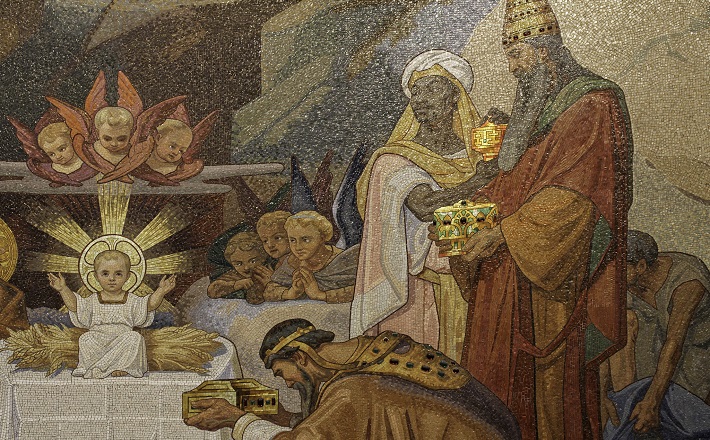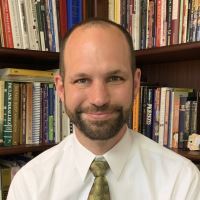Commentary on Matthew 2:1-23
The story of the visit of the Magi, the Holy Family’s flight to Egypt, and even their haphazard return to the Holy Land should help us reflect on the plights of those who cross religious, political, and ethnic boundaries in the pursuit of loving Jesus.
The first people we must study in the text are the Magi. Contrary to the popular Christmas song, these people were not “kings” and there is little reason to think there were three of them.
Elsewhere in the Greek New Testament (for example, Acts 13:6) the (singular) term for magi is translated as “magician.” As early as Herodotus’ writings in the mid-5th century BCE, Greek writers used the term as a pejorative for those who did mysterious acts, such as interpreting dreams or deducing meanings from the stars. Far from being a generic Greek term, however, the word Magi originally meant the religious leaders of the Medes in the Avestan language of Zoroastrian scriptures. Because Matthew’s gospel points out that Jesus’ visitors were “Magi from the East,” the meaning here is probably less about magicians and more about Zoroastrian priests.
These priests left the fire temples to their god Ahura Mazda to travel hundreds of miles to honor and worship the king of the Jews. This may seem strange until we consider the deep religious impact of Jews on Zoroastrian society across the preceding centuries. The Bible is replete with stories of Jews influencing Persian culture in which Zoroastrians lived.
Darius I appointed Daniel as the president of presidents of the Persian empire (Daniel 6:3). Artaxerxes gave Ezra the priest gifts to fund renewed cultic services to God in the Holy Land (Ezra 7:12-26). Artaxerxes directed that wood be supplied from the royal forests to reconstruct the Jerusalem temple (Nehemiah 2:1-8). Ahasuerus (probably meant to reference Atraxerxes) married Jewish Hadassah/Esther and his life was saved by Mordechai the Jew.
Jews and Judaism were important and well-known in Persian society, and their messianic hopes would have been familiar to their Zoroastrian neighbors. At least a few of these priests traveled to Bethlehem because of an astral event, and in so doing, crossed religious, political, and ethnic boundaries to worship the young messiah.
Herod the Great was alarmed by foreigners coming to greet the new king of his realm. Herod’s claim to be king of Judea was extremely tenuous. Herod was a descendent of the Idumeans/Edomites who were conquered and forcibly converted to Judaism by the Hasmoneans (Josephus. Antiquities of the Jews. XIII.9.1.).
Pharisees and zealots held that Herod was not sufficiently Jewish to rule the people. Moreover, Herod the Great’s father had been given control of Judea by the occupying Romans. His lack of religious bona fides and collaboration with the occupying empire made him deeply unpopular. Herod undertook a huge building campaign, including completely refurbishing the Jerusalem temple, to improve his image. To some extent, it worked.
The fragility of Herod’s legitimacy drove him to several brutal acts, including the mass infanticide of Bethlehem as well as executing his wife and several of his own children. All too often, tyrants have considered children expendable when enforcing their own goals, and this was one more story of God’s beloved community suffering through monstrous leadership.
To escape Herod’s madness and ruthless destruction of all potential rivals, the Holy Family fled to Egypt with its different languages and Greco-Egyptian cults. They had already relocated almost one hundred miles from the Galilee to Bethlehem at the demand of the Roman Empire. Now they traveled about six hundred more miles to escape the power of Rome’s violent puppet, Herod. In so doing, they crossed religious, political and ethnic boundaries to save the young messiah.
When Herod the Great died, an angel told Joseph to return to the Holy Land. Apparently, he intended to return the Holy Family to Bethlehem, where they had lived for a couple years (Matthew 2:16). But when he heard that Archelaus, Herod the Great’s son, had been placed in charge of Judea, Joseph changed plans. After another angelic dream warning them, the Holy Family moved to the northern region of the Galilee.
Joseph was right to be frightened of the new Herod. Archelaus’ first act as ruler, even before formally receiving his commission from Caesar, was to murder some 3,000 worshippers in the Jerusalem Temple because they did not support him (Josephus. Antiquities of the Jews. XVII.11.2). Joseph did not want to bring his wife’s son, the king of the Jews, into the clutches of another such murderous king.
Whether the Holy Family crossed through Samaria in the west or Perea and the Decapolis in the east, they encountered practitioners of other religions, speakers of other languages, and members of other (sometimes despised) ethnic groups as they tried to protect the young messiah.
Matthew 2 uses the Magi to highlight the universal importance of the advent of the Messiah. Even priests of other religions were quick to seek him out. No place or people, whether Greek, Egyptian, Samaritan, Roman, Edomite, or Persian, was outside the story or beyond the influence of the young messiah and king. When we preach Matthew’s gospel, we would do well to reflect on the cosmopolitan society, the dangers of empire, and the life-saving necessity of migration in the particularities of Jesus’ young, incarnational life.
PRAYER OF THE DAY
Extravagant God, you sent magi with generous gifts to visit the baby Jesus and proclaim his reign to all the world. Make our voices heard when we proclaim God’s love to all. We pray these things in the name of Jesus Christ, our Savior and Lord. Amen.
HYMNS
We three kings trad.
Brightest and best of the stars ELW 303
The first noel ELW 300
CHORAL
The three kings, Healey Willan


January 6, 2019